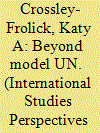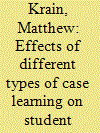| Srl | Item |
| 1 |
ID:
097070


|
|
|
|
|
| Publication |
2010.
|
| Summary/Abstract |
The Model United Nations format is one of the most popular active learning techniques to teach students about the evolving system of global governance and the limits of international organizations. In a world where the UN must cooperate with a variety of actors in the international system to address global challenges, students can benefit from simulations that draw on the intergovernmental Model United Nations format, but move beyond it to explore the complexities of negotiation involving state and nonstate actors. This paper discusses the use and development of a simulation for an upper-level international organization course loosely modeled on the XV International AIDS Conference held in Bangkok, Thailand in July 2004. It explores the value of the simulation, including learning objectives and expectations, student preparation in advance of the simulation, post-simulation debriefing, and an assessment of how the simulation can be modified and made more effective.
|
|
|
|
|
|
|
|
|
|
|
|
|
|
|
|
| 2 |
ID:
097846


|
|
|
|
|
| Publication |
2010.
|
| Summary/Abstract |
Two types of case learning-case studies and problem-based learning-have become staples in our active learning international relations classrooms. Yet few teacher-scholars have examined whether different types of case learning yield different learning outcomes. This study examines the student engagement in response to four different types of case learning: case studies with texts designed for the case method, those using written nontraditional case materials, those incorporating documentary films as case materials, and problem-based learning approaches. I survey students in two International Political Economy classes as a way of yielding an indirect assessment of how effective or useful these different approaches are, and which types of case learning engaged students most. Results suggest that the types of case learning that engaged students' senses in multiple ways-problem-based learning and case studies using films as texts-enhanced their perceptions of the exercises' effectiveness. Case studies that relied on written texts alone were not rated as highly, although were still seen as extremely valuable. These results are consistent with the findings from the cognitive psychology literature that informs the active teaching and learning approach.
|
|
|
|
|
|
|
|
|
|
|
|
|
|
|
|